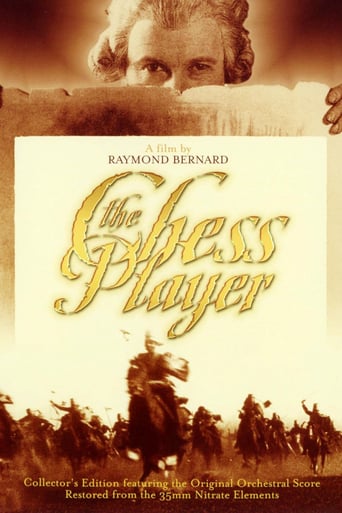anches-725-976306
This French film starts very intriguingly with some hand-held camera work and a story which promises great things but, sadly, it loses its way. The story becomes so confusing that I suspect that mine is not the full version-avenues are opened and not explored, while others are explored without, apparently, being opened. I apologise if the following constitutes "spoilers" but why does Oblomov's manservant dress as a woman?, how does Wanda know she has betrayed Boleslas? and how long can a man with both legs broken be hidden inside an automaton, carted hither and yon and left outside in the snow overnight without suffering fatal consequences? Setting aside these quibbles, this is a fascinating effort and in its time and shown on the big screen I can imagine it was a hit, the scenes involving the automata being especially interesting.
MartinHafer
This is a very beautiful film, artistically speaking. The French crew that made this movie really tried to make it transcend traditional films by having it look exceptional through the use of wonderful camera-work, exquisite sets, great music, sumptuous costumes and a very slow and deliberate pace. While the film does look great, after a little while I also noticed that slow pacing! While it might have impacted the look and sound of the film, it really did need a bit of editing and the guy playing the creator of the automatons should have been told he, too, was not to emote and move as one as well! While none of this ruined the film, it did over time lessen the film's impact. And, frankly, by the time it was over, I felt pretty tired and was more than ready for it to end. This is all a real shame, though, as the basic plot is very interesting and the film has so much going for it. The film is still well worth seeing, but for a better paced "art film", try some of F. W. Murnau's or Fritz Lang's silent films--they've got a great look but just seem better paced.
canscene
"Game Over: Kasparov and the Machine" is a new feature length documentary from famed British film maker Vikram Jayanti. Seen at the 2003 Toronto International Film Festival , it documents the 1997 match between Garry Kasparov arguably the greatest chess player ever and IBM's Deep Blue. The computer won, but subtly the film slyly hints at the possibility that a human mind might have been behind Deep Blue, throwing Kasparov off balance. The Kasparov narrative is interspersed with clips from The Chess Player, although I did not notice any verbal credits in Game Over's narration to that 1927 film.This inclusion was particularly interestng to me, since I saw the original silent film as a boy and remembered vividly how Major Nicolaieff, invading von Kempelen's workshop is hacked to death by the inventor's "bodyguard" of sabre wielding automatons. The Milestone DVD is most certainly the longer version mentioned by a previous commentator on this site. THe DVD also carries a recent radio interview with the author of "The Turk" which deals with the real Wolfgang Von Kempelen and his remarkable chess playing automaton. URTL is <theTurkbook.com?> The movie is undeed slightly confusing, but to movie buffs well worth a viewing for the striking action cinematography wwith tinted footage ranging from black and white to blue of night.
david melville
Comparable to Abel Gance's Napoleon in its scale and stylistic bravura, this romantic epic about the Polish nobility's 1776 uprising against Catherine the Great differs from the more famous film in its lack of nationalist fervour and Tricolour bombast. Its one 'rousing battle scene' is a pure fantasy, a daydream of its naive heroine as she thumps out a patriotic hymn on her piano. This dream sequence is daringly intercut with the actual battle - a fiasco whose leaders are killed and maimed, bringing no glory to either Russian imperialists or Polish rebels.In place of Boys Own heroics, director Raymond Bernard conjures up an eerily perverse atmosphere of ETA Hoffman-style Gothic Expressionism. The young hero's 'protector', the Baron von Kempelen, is based on a real-life inventor who stunned the courts of Europe with his life-size mechanical dolls. On the run after his abortive revolution, young Boleslav is disguised by the Baron as a chess-playing robot - not a man, but a mechanical image of one. He finds his true self, not on the battlefield, but in the wholly unreal world of chess. His sister Sophie becomes an icon of Polish liberation, not in person, but as a woven banner. Her forbidden love for a Russian officer is consummated, not in the flesh, but in a portrait he paints of her.In short, Bernard is a film-maker in thrall to illusion - and to the inherently unreal nature of the cinematic image. At the film's climax, not one but two artificial worlds fight it out for control of the screen. A sumptuous masked ball at the Imperial Court, and the villain's showdown with Baron von Kempelen's army of automatons. History, or so Bernard seems to be saying, is not a fact but an illusion, a masquerade, a war of manufactured images that its leaders manipulate for their own ends. Heroism has nothing to do with it.David Melville



